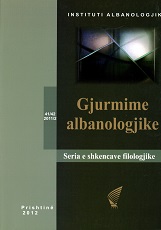ROMAN I ROMANEVE - "BIJTË E ASKUJT" I-II I REXHEP QOSJES
NOVEL OF THE NOVELS - "BIJTE E ASKUJT/NOBODIES SONS" I-II I REXHEP QOSJES
Author(s): Feride PaplekaSubject(s): Literary Texts
Published by: Instituti Albanologjik i Prishtinës
Keywords: NOVEL OF THE NOVELS ; "BIJTE E ASKUJT/NOBODIES SONS" ; REXHEP QOSJES
Summary/Abstract: The most recent novel of the writer Rexhep Qosja titled “Bijtë e askujt”, I II, as a saddest and most shocking emblem of Albanian fates in history, is naturally introduced in the flows of postmodern literature to prove the unproved, to say what has remained unsaid, to discover “back side” of reality, according to the expression of Austrian novelist Hermann Broch. Postmodern literature sees its success through providing of what it calls a failure. Such examples we can find in the work of prominent writers, such as: Pasternak, Beckett, Ionesco, Musil, Steinbeck, Dos Passos, Valzer etc. Moreover, if we go earlier in time, we would cite Dante or Shakespeare and would call them rightfully contemporaries. In Qosja’s literary work the power of words comes from the consciousness of a truth which is emerges in the midst of the mixtures of fictions with reality. Qosja with this novel goes beyond the limits which are usually kept by a literary work and approaches to the endeavors of Montagne, Ruseau and Voltaire, by presenting the case as an exercise of thought. Incitement to reflect, this way that leads the reader toward unfamiliar paths, constitute the captive beauty of his writing. Successor of a society filled with critics on the novel, Rexhep Qosja has created a multi-voice novel, immersing us in a life filled with passions and concerns. Author was and is worried about private fate and collective fatality over entire his work. Luis Borges claimed that fiction is a form of reality. Most powerful feature of this book is affirmative value. The novel „Bijtë e askujt“ has within it the reasons of ethics of writing contemporary scenes, which provide him with undisputable values, as oppositional text in general, but incompatible especially with the atavism of the ruler and spirit of One which has ruined and ruins Albanian society. This approach is intertwined also with the courage of author’s high authority in contemporary letters.
Journal: Gjurmime Albanologjike - Seria e shkencave filologjike
- Issue Year: 2011
- Issue No: 41-42
- Page Range: 335-348
- Page Count: 14
- Language: Albanian
- Content File-PDF

